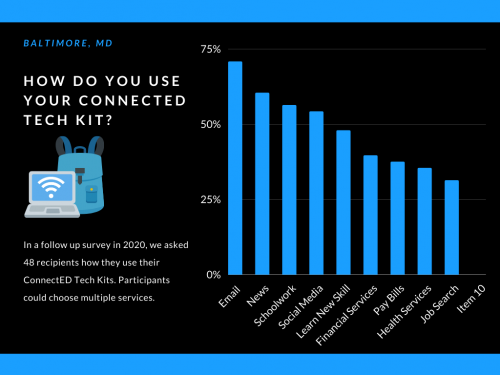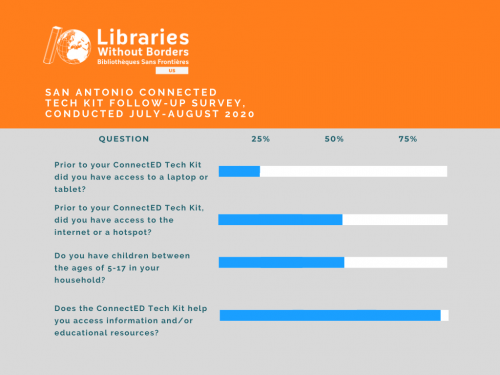
Libraries Without Borders US
It's an urgent matter. The need to read. Make a donation!
At a glance: LWB US’ community impact
Libraries Without Borders US is committed to meeting people where they are with the informational and educational resources they need most. Fundamental to this mission is our commitment to place-based work and human-centered design: tailoring each program to respond directly to community wants and needs.
Since the inception of the ConnectED Tech Kit program and our other COVID-19 rapid response initiatives, we have therefore dedicated ourselves to conducting surveys, communicating with our constituents, and effectively responding to their evolving needs. In this final installment of our COVID-19 blog series, we will be sharing what we found along the way, and the impact our programs have had on communities struggling with the disastrous effects of the COVID-19 pandemic.
Beyond basic necessities of food and water, the pandemic has brought to light newfound health challenges, especially for those lacking access to the internet and critical digital devices. For example, in light of the COVID-19 vaccine rollout, many Americans without online access are also facing a significant health emergency. As of January 2021, over half a million Baltimore residents —23% of the population— didn’t have reliable internet access. Today, that lack of access means that at least 23% of Baltimorians cannot access vaccine information, waitlists, and virtual updates regarding the rollout, in addition to countless other resources. In today’s world, lack of connectivity has unprecedented repercussions. By understanding the severity of these circumstances, LWB US designs programs that swiftly meets community needs.
Multiple months after implementing the ConnectED Tech Kit program, we followed up with kit recipients to learn about their experiences. Here is what we found about our program:

As of 2021, LWB US has distributed more than 220 tech kits in both Baltimore and San Antonio, with an ever-growing waitlist of interested residents. In a follow-up survey of residents with tech kits, we confirmed that these kits fulfill the needs of many: 54% of recipients Baltimore and 76% of recipients in San Antonio did not have access to a laptop or tablet prior to participating in this program.
Tech Kits Distributed
0
+
In Baltimore, 56% of recipients now use their ConnectED laptops and hotspots for school-work and education, while 59% in San Antonio use theirs to seek employment. In a post-survey testimonial, a San Antonio resident and recipient of the ConnectED Tech Kit stated that she found it “really helpful…with school, medicaid for self and [my] child.”
